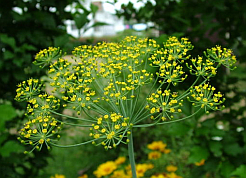Growing Dill
(tips on growing dill in your garden)

Dill is one of our favorite flavors. We often use it in egg and potato salad. There’s nothing better than tender, fresh dill leaves to really perk up a dish.
Dill is an interesting plant because it makes a great companion for a number of vegetables and other herbs. But, there are a few exceptions and contradictions regarding our dill companion planting research. Before gardening with dill, you should review this companion planting guide and our guides on growing dill and companion planting with herbs.
Dill Companion Planting
Companion planting dill will help help asparagus, the Brassicas (broccoli, brussels sprouts, cabbage, cauliflower and kohlrabi), chervil, corn, cucumber, lettuce and onion. Conversely, planting beans near dill will be beneficial to the growth of your dill plants. One source identified lettuce as the best dill companion plant.
Companion planting dill with Growing angelica, cabbage, caraway, carrots, chili and bell peppers, eggplant, fennel, lavender or potatoes is not recommended as they are all poor companions for dill.
Dill, Carrots & Cross Fertilization.
Dill and carrots are both in the Umbelliferae family. If dill is allowed to flower, it can cross pollinate with carrots which is why the two should not be planted together. Dill can also cross-pollinate fennel but is one of the few good companion plants for fennel.
Companion Planting Dill & Cauliflower
Our sources were contradictory about planting cauliflower with dill. It is probably not worth the risk to plant them together.
Companion Planting Tomatoes & Dill
Obtaining the benefits of companion planting dill with tomatoes requires a bit of vigilance. The growth and health of tomatoes will improve from being planted near young dill. However, once the dill matures it will stunt the growth of your tomatoes and should be moved. Dill also attracts tomato horn worms which will make it easier for the pests to find your tomato plants if the dill plants are left to mature.
One good strategy might be to plant them together. Then, once the dill is strong enough, transplant to another part of the garden to divert the horn worms away from your tomatoes.
Dill & Insects.
Dill attracts a number of beneficial insects to your garden. Those insects include honeybees, hoverflies, Ichneumonid wasps and other wasps. Swallowtail butterfly caterpillars particularly enjoy dill.
Dill plants are said to be an effective natural insect repellent against aphids, cabbage looper, spider mites and squash bugs.
Swallowtail butterfly caterpillars are said to enjoy dill.
Additional Dill Information
(Anethum graveolens, Linn.)
To learn more about growing dill be sure to check out our dill fact sheet.
Buy Dill Seeds
Dill is such a fragrant herb and one that is loved by butterflies.
Why not add some to your own herb garden this year with these heirloom seeds from Botanical Interests?
Customers who have already purchased these seeds report that they have a great germination rate and grow well.
Dill Bouquet Certified Organic Heriloom Seeds 600 Seeds
Pickles!
You now know where to plant dill in your garden and we’ve also shared with you some tips on growing dill. But, what will you do with all of that beautiful dill weed you’ve grown? Make Pickles! Oooh yummy.
This short guide and recipe book teaches you how to combine cucumbers, vinegar, dill weed and a variety of other ingredients to create your own pickled delicacies. They leave out all the fluff that fills the pages of more pricey cookbooks and boil things down to simple, easy to follow instructions that will have even novice cooks presenting their friends and family with the best pickles they’ve ever had the pleasure of eating.
Best of all, Favorite Pickles & Relishes: Storey’s Country Wisdom Bulletin A-91 is one of a number of of the wonderfully write Storey’s Country Wisdom series of country living guides. They are also offered for $3 or so by Amazon in the Kindle Reader format.



The flowers on Dill are one of the best attractants to predatory wasps which are the number one way to control cabbage worms and tomato hornworms in the garden. I’ve never heard that dill attracts tomato hornworms but if the dill itself did, then the predatory wasps that the flowers attract are going to destroy the worms. Ever since I started planting dill in with my cabbage and tomatoes I’ve had zero worm problems. The predatory beneficial wasps take care of any problems that might develop
CTGG,
Thank you for sharing your experience with dill. I suspect a lot of the companion planting advice varies by area and each gardener’s overall planting strategy. It sounds like you have a wonderful, balanced garden and attract enough good guys to take care of the bad ones for you.Happy gardening.